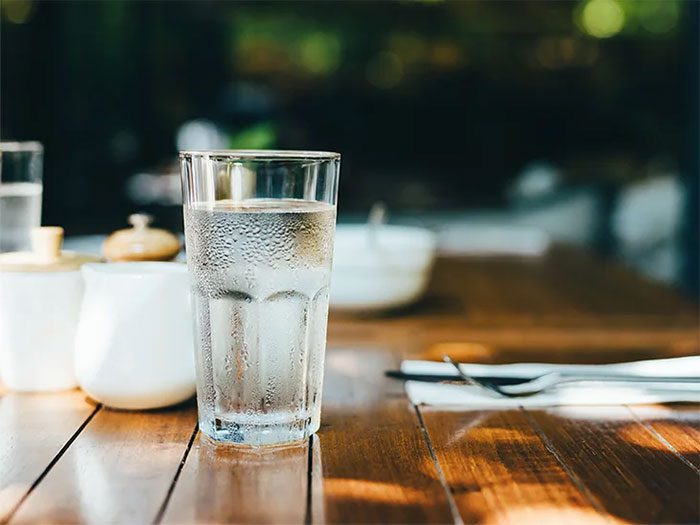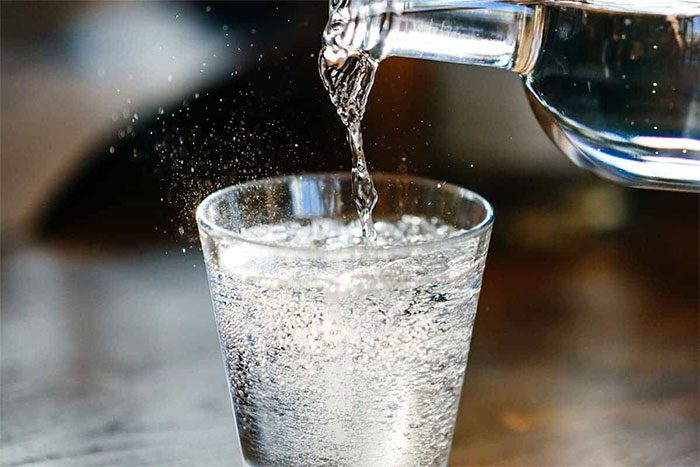If purified water is left exposed to the air without a cover for several hours, it can become contaminated with dust and bacteria…
How Long Can Purified Water Be Used?
Purified water can last indefinitely if stored properly. The first consideration is the container you are using to hold the purified water. The container must be clean and free of any contaminants that could harm the water. Glass or BPA-free plastic bottles are good options. Ensure that the container is tightly sealed to prevent any external contaminants from entering the water.

Purified water can spoil if not stored properly.
If you are sourcing water from a filtration system, you should replace the filters every six months if they have not been changed already. This ensures that the water remains clean and safe to drink. Additionally, filters can become less effective over time, so changing them will ensure they function properly.
How to Identify Spoiled Purified Water
Purified water does not have an expiration date. However, it can spoil over time if not stored correctly. Here are some signs that your purified water may have gone bad:
- Odor: If the water smells musty or like rotten eggs, this is a sign that bacteria are growing in the water.
- Taste: Water that tastes unpleasant is a clear indication that something is wrong. If the water tastes sour, metallic, or unusual, it is best to dispose of it.
- Appearance: If the water is cloudy or has an unusual color, this is a clear sign of contamination or bacterial growth in the water.
If you notice any of these signs, it is best to discard the water and replace it with fresh purified water.
How to Store Purified Water
The best way to store purified water is in a clean, airtight container, away from direct sunlight. Direct sunlight can cause algae to grow, making the water taste and smell unpleasant.
You also need to keep the water container in a dry, cool place to prevent bacterial growth. Ensure that the container is not stored near any chemicals or other contaminants that could harm the water.

Regardless of the type of water, it’s best to consume it within a short period.
In the Refrigerator
If you store purified water in the refrigerator, ensure that it is kept in a clean container. The container must be airtight so that no contaminants from food or air can enter the bottle. A plastic or glass bottle is an ideal solution. When stored in a bottle in the refrigerator, purified water can be used for several weeks.
However, when it comes to any type of water, it is best to consume it within a short period.
Other liquids, such as fruit juices or foods containing sugar, can easily show signs of mold growth. In contrast, purified water can remain clear even when contaminated.
Manufacturers use strict bottling methods to ensure the longevity of water in supermarkets. This type of bottling is difficult to replicate at home or in the workplace, where the environment is not as controlled.
At Room Temperature
Room temperature does not make your purified water safe for long-term use. Since room temperature is generally quite warm, purified water can be exposed to heat and other factors present in the air.
These can be invisible to the naked eye, but they can contaminate the water. This not only alters the taste but also introduces bacteria into the water that can cause illness. You may notice this if you leave a glass of water on your desk for several days.
If you want to drink purified water at room temperature, you should not leave it for more than a few hours before drinking.
Bottled Water
Store-bought bottled water has an expiration date. Many food laws in Europe and America require bottled water to have this expiration date. This is not due to the water itself but rather the plastic bottles that contain it.
If a water bottle is exposed to sunlight, the plastic can break down and leach into the water. Commercial bottled water should not be reused.


















































